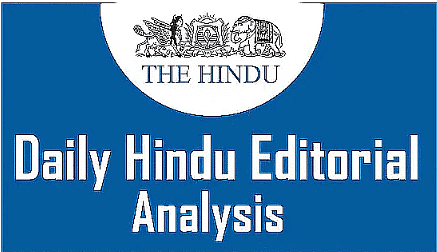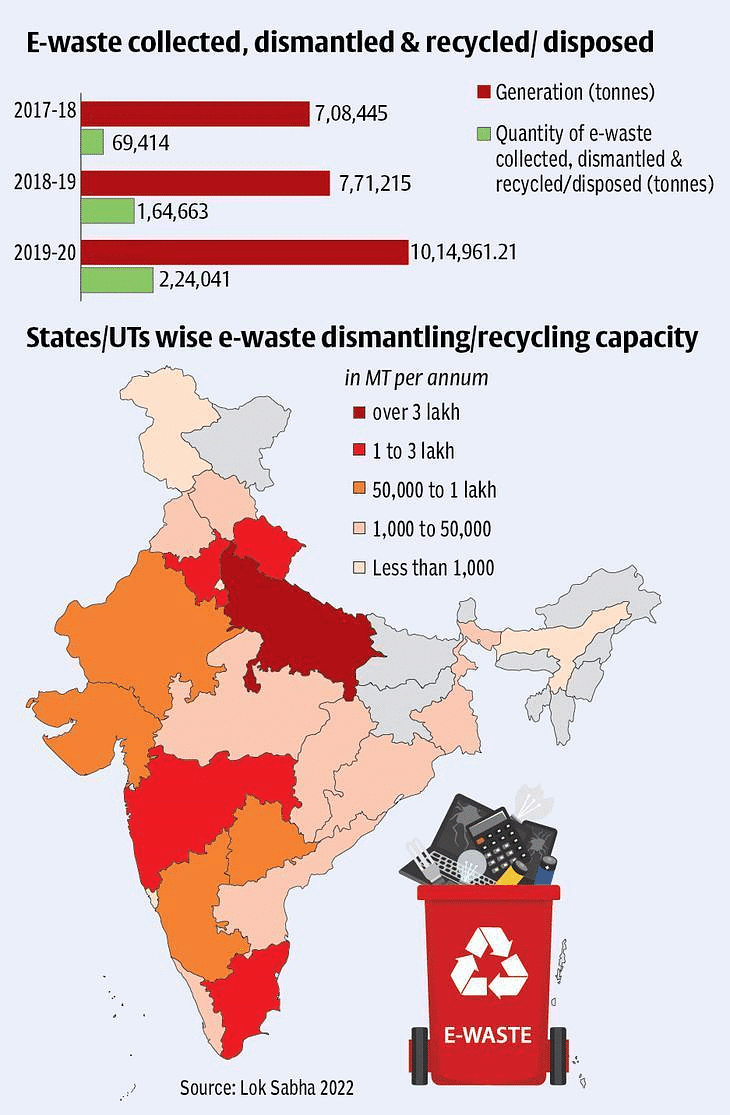UPSC Exam > UPSC Notes > Current Affairs & Hindu Analysis: Daily, Weekly & Monthly > The Hindu Editorial Analysis- 28th February 2023
The Hindu Editorial Analysis- 28th February 2023 | Current Affairs & Hindu Analysis: Daily, Weekly & Monthly - UPSC PDF Download

Unpacking the new set of e-waste rules
Context
The government recently notified E-waste (management) rules 2022 that will come into force from 1 April 2023.
Major Highlights of E-waste (management) rules 2022
- Application:
- It will apply to every manufacturer, producer, refurbisher, dismantler and recycler involved in manufacturing, sale, transfer, purchase, refurbishing, dismantling, recycling and processing of e-waste or electrical and electronic equipment.
- The rule is applicable to all electrical devices and radiotherapy equipment, nuclear medicine equipment and accessories, Magnetic Resonance Imaging (MRI), electric toys, air conditioners, microwaves, tablets, washing machine, refrigerator and iPad among others.
- Restrictions:
- The government has restricted the use of hazardous substances in manufacturing electrical and electronic equipment (EEE) following deaths due to exposure to radioactive material.
- It mandates the reduction of the use of lead, mercury, cadmium among others in the manufacturing of electronic equipment.
- The government has restricted the use of hazardous substances in manufacturing electrical and electronic equipment (EEE) following deaths due to exposure to radioactive material.
- Reuse and recycling:
- Manufacturers shall use the technology or methods so as to make the end product recyclable and shall ensure that components or parts made by different manufacturers are compatible with each other so as to reduce the quantity of e-waste.
- Strict monitoring:
- The Central Pollution Control Board shall conduct random sampling of electrical and electronic equipment placed on the market to monitor and verify the compliance of reduction of hazardous substances provisions.
- If a product does not comply with the e-waste management rules, the manufacturer will have to withdraw all samples from the market.
- The Central Pollution Control Board shall conduct random sampling of electrical and electronic equipment placed on the market to monitor and verify the compliance of reduction of hazardous substances provisions.
- Extended Producer Responsibility Certificates:
- Draft rules aim to incentivise registered electronic waste recyclers by introducing EPR or Extended Producer Responsibility certificates (which was not part of 2016 Rules).
- E-waste exchange facilities:
- The EPR requires producers to set up e-waste exchange facilities to facilitate collection and recycling, and assign specific responsibility to bulk consumers of electronic products for safe disposal.
- Imports:
- Imports or placement in the market for new electrical and electronic equipment shall be permitted only for those which are compliant with provisions laid down by the government.
- Disposal:
- It is the responsibility of the manufacturer to collect e-waste generated during manufacture and to ensure its recycling or disposal.
- However, the rule does not apply to waste batteries, packaging plastics, micro enterprises and radio-active waste, as covered under the provisions of the law.

- However, the rule does not apply to waste batteries, packaging plastics, micro enterprises and radio-active waste, as covered under the provisions of the law.
- It is the responsibility of the manufacturer to collect e-waste generated during manufacture and to ensure its recycling or disposal.
- Only 22.7 per cent of the e-waste out of the total 10, 14,961.21 tonnes generated in 2019-20 in India was collected, dismantled, and recycled or disposed off.
- This e-waste is composed of 21 types of electrical and electronic equipment (EEE) notified Under the E-Waste (Management) Rules, 2016.
- The E-Waste (Management) Rules, 2016 extend the responsibility to producers to manage a system of e-waste collection, storage, transportation, and environmentally sound dismantling and recycling through Extended Producer Responsibility (EPR) authorisation.
- The rules also promote and encourage the establishment of an efficient e-waste collection mechanism.
- India is the world’s third largest generator of e-waste after China and the US, according to the UN Global E-Waste Monitor Report.
- Maharashtra generates the most e-waste among all the Indian states.
- Uttar Pradesh, Uttarakhand, Tamil Nadu, and Haryana are among the States that have a bigger capacity to dismantle and recycle e-waste.
- E-waste typically does not feature in the list of municipal solid waste and therefore it is not a direct mandate for the cities to collect, transport, and manage them.
Major Issues related to E-waste in India
- Health issues: The metal in e-waste includes mercury, lead, cadmium, polybrominated flame retardants, barium and lithium, all of which are hazardous to human health.
- Toxins’ harmful health impact on humans includes damage to the brain, heart, liver, kidneys and skeletal system.
- Global ecosystem
- Improper e-waste disposal is highly hazardous to the global ecosystem.
- Volume of E-waste generated: India stands fifth in e-waste generation producing around 1.7 lakhs metric tonnes per annum.
- Involvement of Child Labor: In India, about 4.5 lakh child laborers in the age group of 10-14 are observed to be engaged in various E-waste activities and that too without adequate protection and safeguards in various yards and recycling workshops.
- Ineffective Legislation: There is absence of any public information on most SPCBs/PCC websites. Even the basic E-waste Rules and guidelines have not been uploaded.
- Lack of infrastructure: There is a huge gap between present recycling and collection facilities and the quantum of E-waste that is being generated.
- Lack of incentive schemes: No clear guidelines are there for the unorganized sector to handle E-waste. Also no incentives are mentioned to lure people engaged to adopt a formal path for handling E-waste.
- E-waste imports: 80 percent of E-waste in developed countries meant for recycling is sent to developing countries such as India, China, Ghana and Nigeria.
Way forward/ Suggestions
- Recycling: To reduce the dangerous impacts of e-waste, it is critical to e-cycle goods effectively so they can be recycled, refurbished, resold, or repurposed.
- Domestic legal framework to address these gaps in import of E Waste.
- Need to address safe disposal of domestic waste.
- Attract investment in this sector.
- Link up activities of the informal sector with the formal sector.
- Promote adequate ESM technologies for recycling.
- Incorporate precautionary principles and polluter pays.
- Impart training to generators on e-waste handling.
- Awareness program on recycling.
- Fix duties and responsibilities to recyclers.
- Tax incentives for scrap dealers.
- Reward and reprimand schemes for performance and non-compliance of e-waste management.
The document The Hindu Editorial Analysis- 28th February 2023 | Current Affairs & Hindu Analysis: Daily, Weekly & Monthly - UPSC is a part of the UPSC Course Current Affairs & Hindu Analysis: Daily, Weekly & Monthly.
All you need of UPSC at this link: UPSC
|
38 videos|5288 docs|1117 tests
|
Related Searches
















